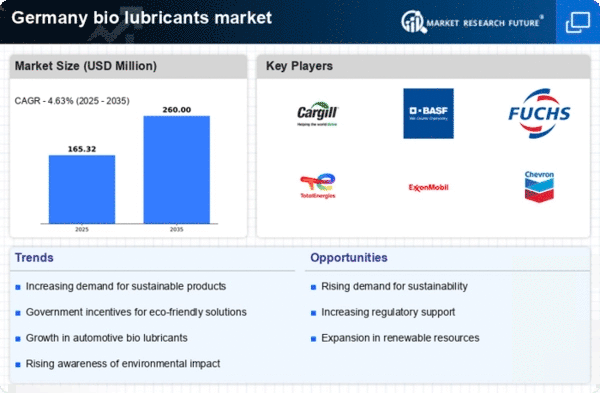Market Analysis
In-depth Analysis of Germany Bio-lubricants Market Industry Landscape
The German market for bio-lubricants is undergoing a lot of changes that are driven by blending environmental issues, regulatory frameworks and the search for sustainable substitutes in the lubricants industry. As an ecologically friendly replacement of traditional lubricants produced from petroleum oils, bio-lubricants made from renewable sources such as vegetable oils and animal fats have become popular. This therefore implies that growing awareness towards sustainability is one important factor driving market dynamics in Germany. The country, which is already leading when comes to ecological concerns, has observed rising demand for environmentally benign industrial equipment resulting in high demand for bio-lubricants as manufacturers try to meet stringent laws governing their operations.
Regulatory initiatives and policies play a major role in shaping the market dynamics of bio-lubricants in Germany. There are measures put in place by the country to cut down on greenhouse gas emissions and promote green products use. This has prompted shifts within auto and manufacturing sectors hence moving towards adopting biolubes which have low carbon footprints as opposed to traditional lubricants. In this way, market dynamics are aligned with regulatory objectives thereby making bio-based lubricant informed choices possible and sustainable regarding Germany’s landscape on lubricants.
Given Germany's prominent position in global automotive systems, its influence on market dynamics is significant. These include engine applications such gearboxes, hydraulic system thus reducing frictional losses wear among others. With increased emphasis on sustainable practices by carmakers, demand for these products keep increasing significantly changing these trends influencing innovation oin the development of more tailored lubricant formulations capable of meeting emerging requirements within the automotive industries.
Technological advancements coupled with research investments also drive innovation within the German Bio-lubricant Market. For instance, scientists constantly seek new feedstocks and refine production methods so as to enhance performance characteristics of biolubes. Therefore, this technology advancement not only contributes to the market’s growth but also addresses compatibility and efficiencies issues of bio-lubricants in different applications.
These bio-lubricant market dynamics are also influenced by a focus on circular economic principles. This has prompted Germany to align industries with practices that reduce waste and design approaches for resource reutilization. In fact, biolubes as renewable alternatives to conventional lubricants in accordance with the closed-loop system can be used for achieving a more sustainable and environmentally friendly model thus meeting German sustainability requirements.
Market dynamics are also influenced by the economic viability and cost competitiveness of bio-lubricants. However, despite increased demand for renewable solutions, their production costs remain a critical factor affecting market dynamics. Manufacturers have to find ways of balancing between cost-effective production of biodiesel oils and ensuring that they meet standard performance criteria needed in industry. Meeting cost challenges is necessary if there is going to be widespread use of these products across multiple industrial applications within Germany.
Challenges within market dynamics include need for greater awareness and education. Therefore, it is vital that comprehensive sensitization programs should be launched so as to provide information regarding benefits and applicability of biolubes among businesses, consumers in various industries. This will help clarify misgivings from both sides thus leading to informed decisions thereby improving acceptability levels of aforementioned commodities within German markets.






Leave a Comment